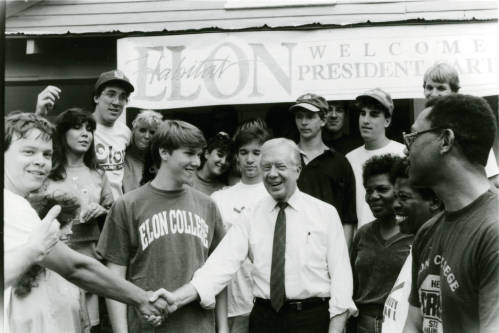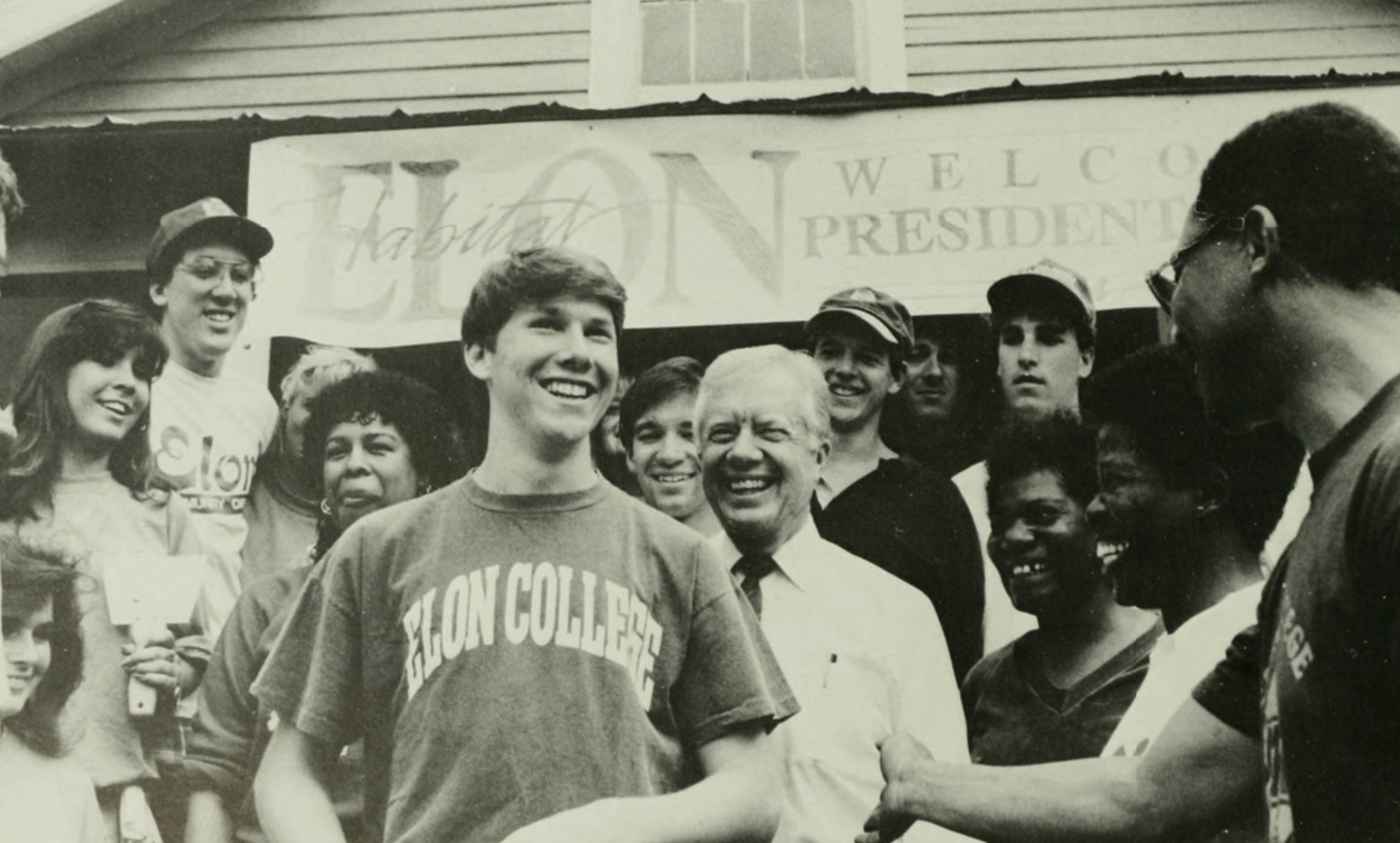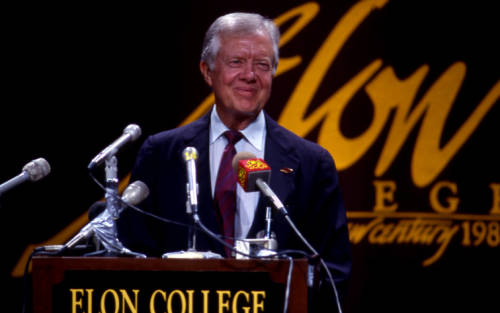Carter, who was elected president of the United States in 1976, visited Elon University during its centennial celebration in 1989 and connected with the university’s Habitat for Humanity chapter.
Former President Jimmy Carter, the longest-living U.S. president in history, passed away on Dec. 29, 2024, at age 100. Carter had a special connection with Elon University as the honored guest at the university’s centennial celebration in 1989.
A former governor of his home state of Georgia, Carter was elected president in 1976 and, after leaving office in 1977, dedicated his post-presidency life to diplomacy and humanitarian efforts. In 1982, he established The Carter Center, a nongovernmental and nonprofit organization dedicated to advancing human rights and alleviating human suffering. Among his service work, Carter dedicated himself to supporting the work of Habitat for Humanity, a global nongovernment organization dedicated to building affordable housing.
Carter’s work as a politician, diplomat and humanitarian was already well-known when he was invited to Elon to mark the 100th anniversary of its founding in 1889. His 1989 visit came less than a year after Elon launched one of the first campus chapters of Habitat for Humanity in the country and fit well with the centennial celebration’s theme of “Reaffirming a Tradition of Service.”

“My name’s Jimmy”
University Chaplain Emeritus Richard McBride hand-delivered the invitation to speak at Elon for its 1989 Spring Convocation on April 25. Carter accepted, with his visit going beyond taking the stage in Alumni Gym to include extensive interactions with Elon’s nascent Habitat chapter. McBride recalls that Carter visited the chapter’s work site adjacent to where the Station at Mill Point now sits.
“He was very gracious in conversing with students, including campus chapter President John Barnhill ‘92, the homeowner Roger Cornell and five-year-old Brinkley Messick, saying ‘Hi! My name’s Jimmy. What’s yours?” McBride recalls.
Barnhill, who now serves as associate vice president for university advancement at Elon, fondly recalls Carter as a genuine, sincere and humble leader who interacted easily with those at the Habitat work site that day.
“That moment embodied his sincerity in wanting to meet each person where they were,” Barnhill said.
He remembers a humorous photo opportunity when fellow Habitat chapter members said to him, “Mr. President, we want you to meet President Jimmy Carter. “I thought that was so funny and as part of the joke, stepped forward just in front of President Carter [as a photo was taken], making it seem like that’s why people were there that day,” Barnhill said. “I have that picture in my office today. Luckily, we both have grins capturing that he thought it was funny, too.”

Conversations with Carter
But this was not the first time Carter visited campus. In 1975, President Emeritus Dr. J. Fred Young recalls Carter came to campus for a rally as a candidate. Tired from work, Young skipped the event, which he says may have cost him a potential appointment after the election.
But Young got to connect with Carter more than a decade later, serving as his escort during the 1989 visit, including the trip from the Greensboro airport to campus. During the ride, Carter spoke with Young about his post-presidential hobbies: turkey hunting and fly fishing. Luckily, Young had read a magazine about turkey hunting while waiting for a dentist appointment – so he could keep up with the conversation.
“It was really delightful,” recalled Young. “We didn’t talk about Camp David, the election, President Reagan, that sort of stuff. We talked about turkey hunting and fly fishing. He was like any other person with a serious hobby, so that was great fun.”
At one point, while walking on campus, Young and Carter ran into the late William E. Loy Jr., longtime benefactor and friend of the university.
“I looked up and said, ‘Why, hello Bill Loy, I’d like for you to meet President Carter.’ Well, I thought he was going to faint. He probably didn’t know Carter was on campus, and there he was, standing there shaking his hand. It was one of the most pleasant events,” said Young. “Bill was known for being loquacious, and that was the only time that I’d ever seen Bill where he had nothing to say.”
As part of the celebration, Carter was an honored guest at a gala reception and dinner at Alamance Country Club attended by trustees, donors and important friends of the college, with everyone jockeying to meet the former president. Young’s wife Phyllis sat next to Carter at dinner, talking with him about their similar upbringings on farms. In her book “Adventures with Phyllis: At Home and Abroad,” she published a letter to Carter in response to his book “A Full Life.”
“I had the great pleasure of being seated by you at dinner (I’m sure you remember!),” wrote Phyllis Young. “I remember the patient way you stood by every person attending the dinner for photos after dinner.”

People are the center
Vice President Emerita Nan Perkins remembers Carter surprising everyone at the conclusion of his post-dinner speech by asking that the kitchen and wait staff be invited into the ballroom.
“When all were assembled, he led a round of applause for their role in preparing and serving such a delicious meal, and then he left the dais to walk down the line of staff and personally shake hands with and thank each one,” Perkins said. “Every face was beaming with pleasure and pride. It spoke volumes about his generous nature and his respect for all persons, regardless of status.”
Professor Emerita Laura Roselle connected with the former president before she joined the faculty at Elon when she was an intern at The Carter Center in Atlanta “when it consisted of a room in the library at Emory University.”
“I worked at The Carter Center and grew up along the way, as it moved from a room to a house to the center as it stands today,” Roselle said. “Helping Presidents Carter and Ford with a conference on nuclear disarmament and doing research on Soviet and then Russian television with Professor Ellen Mickiewicz gave me a wonderful opportunity to see President Carter at work. I learned so much from him and how he comported himself.”
Among the things she learned — he always seemed to know everyone’s name and a bit about them. “I heard he worked to make sure he knew these names because people are the center of all things,” Roselle said.
She visited his house in Plains, Georgia, where he was born and grew up, and she was struck that he had returned to the same house he was living in before he was president.
“It is modest and comfortable and welcoming. I just thought this man lives his values,” Roselle said. “He helped inspire me to go to graduate school in political science at Stanford, and his ideas influenced my life and my scholarly work on strategic narratives in international relations.”
Long-lasting impact
Carter’s influence on members of the Elon community extended beyond his visit in 1989.
“President Carter’s commitment and dedication to improving lives with dignity and love through Habitat for Humanity was inspiring to me,” said Kevin Gilmore ’96, the executive director of the Sussex County Habitat for Humanity in Delaware. Gilmore received the Distinguished Alumni Award in 2015. “I had the privilege to meet President Carter several times during my 26-year career with Habitat for Humanity, and his steadfast faith, action and humility inspired me in my service many times.”
Steve Messinetti ’94 is now the president and CEO of Habitat Portland Region and was awarded the Young Alumnus Award in 1999. Messinetti remembers Carter for his “unwavering work ethic and values.”
“President Carter will always be Habitat for Humanity’s most famous volunteer and the person who had the most influence in the organization’s exponential growth as a leader in housing development and policy change throughout the world,” said Messinetti. “I spent 10 years working at the Habitat headquarters in Americus, Georgia, and seeing and hearing from President Carter in this small town nearby where he lived most of his life was pretty common. I believe President Carter’s legacy and principles will continue to be the True North for Habitat, causing us to continuously challenge ourselves to do more and be better for our community until everyone has an affordable place to live.”
Funeral services for Carter began Saturday, Jan. 4, and will culminate in the official state funeral on Jan. 9. President Joe Biden has declared Jan. 9 a national day of mourning, closing all executive departments and agencies. Flags are also ordered at half-staff for 30 days.



